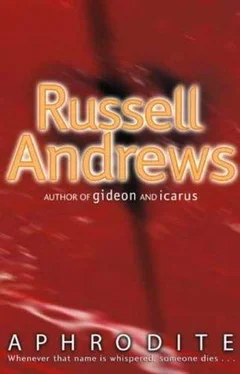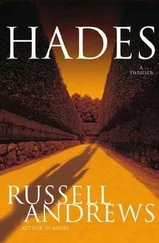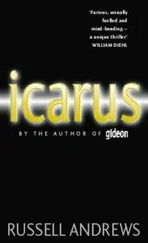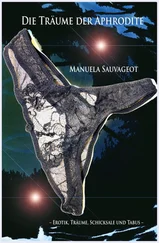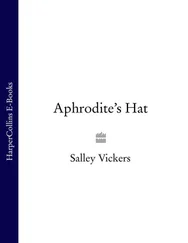Russell Andrews - Aphrodite
Здесь есть возможность читать онлайн «Russell Andrews - Aphrodite» весь текст электронной книги совершенно бесплатно (целиком полную версию без сокращений). В некоторых случаях можно слушать аудио, скачать через торрент в формате fb2 и присутствует краткое содержание. Жанр: Триллер, на английском языке. Описание произведения, (предисловие) а так же отзывы посетителей доступны на портале библиотеки ЛибКат.
- Название:Aphrodite
- Автор:
- Жанр:
- Год:неизвестен
- ISBN:нет данных
- Рейтинг книги:3 / 5. Голосов: 1
-
Избранное:Добавить в избранное
- Отзывы:
-
Ваша оценка:
- 60
- 1
- 2
- 3
- 4
- 5
Aphrodite: краткое содержание, описание и аннотация
Предлагаем к чтению аннотацию, описание, краткое содержание или предисловие (зависит от того, что написал сам автор книги «Aphrodite»). Если вы не нашли необходимую информацию о книге — напишите в комментариях, мы постараемся отыскать её.
Aphrodite — читать онлайн бесплатно полную книгу (весь текст) целиком
Ниже представлен текст книги, разбитый по страницам. Система сохранения места последней прочитанной страницы, позволяет с удобством читать онлайн бесплатно книгу «Aphrodite», без необходимости каждый раз заново искать на чём Вы остановились. Поставьте закладку, и сможете в любой момент перейти на страницу, на которой закончили чтение.
Интервал:
Закладка:
At first, Wallace P. didn't know what was bothering him so much about the obit. One thing that annoyed him was that he'd never heard of William Miller, and he was convinced he'd heard of everybody. But it was more than that. It was the 1938 costume drama, The Queen of Sheba. And William Miller's Academy Award nomination for Best Supporting Actor. Even now, days later, Wallace felt the bile rising in his stomach. Nobody had ever been nominated for an Oscar for some historical piece of shit like that. And definitely not in 1938. Best Supporting Actor nominations that year were Gene Lockhart for Algiers-no one even remembered him-John Garfield for Four Daughters, Basil Rathbone for If I Were King, and-oh yes-Robert Morley for Marie Antoinette. Walter Brennan won for Kentucky. No goddamn William Miller. Nobody who had the word "cowboy" in the headline of his obituary. He didn't even have to look it up. Christ!
The Friday he'd read the article, Wallace had tried to calm himself down. He knew that the rage within was starting to spill over onto the outside. But he couldn't contain it. Fucking small-town papers! How could they make a mistake like this? How could they not know? And then Wallace P. realized he wasn't just thinking those things, he was speaking them aloud, yelling them, actually, although there was no one else in his house. For the first time in a long time, Wallace P. Crabbe also realized that he wanted to tell someone-no, needed to tell someone-about this horrible thing, this inexcusable error that seemed to him to spell the end of modern civilization. This was something he could not push away and ignore with a happy smile on his face.
He tried calling his girlfriend but all he got was her office voice mail. He left a message saying that it was important and she should call him. He then called one person who still worked at his old publishing company, a fairly precise production guy, but although this person sympathized with Wallace's opinions about the world's ineptness, he didn't see what the big deal was. After he hung up, he decided that this emergency called for some real action, so Wallace P. stormed to the phone book, looked up the number he wanted, once again grabbed the telephone hat hung on the wall of his small kitchen, and called the East End Journal. Amazingly enough, the person who picked up the phone was actually the man who owned and edited the paper, and he said he'd be more than happy to listen to Wallace's tirade. The owner did indeed listen, although not nearly as long as Wallace would have liked him to. And he kept calling him "Wally," which infuriated Wallace even more. At some point, the owner thanked him for spotting the errors and promised that he would take care of it. He asked for a phone number and address so someone could let him know when to look for the correction in the paper. The editor told him it would probably be printed in next Friday's issue. Wallace gave him the information-but only after insisting that the editor write his name down as Wallace, not Wally. He made him spell it back to him and still, when the man hung up, he said, "Thanks for calling, Wally."
Wallace was certain that no one would ever call, sure that the guy was lying to him. If there was something of which Wallace was positive, it was that he did not trust anyone who insisted on calling him Wally. He was sure that the owner was listening to him just the way Wallace listened to everybody else: patiently, smiling, nodding, and paying absolutely no attention. Wallace P. was as sure about this as he'd ever been of anything in his whole life.
So he was particularly surprised when someone from the police department called and asked if he'd be home in the afternoon. The policeman said that it was about the obit that had run in the paper.
Wallace said he'd be home and he'd be happy to talk about it.
He was delighted that someone had, in fact, been listening to him.
That delight turned to anger once again when, before hanging up, the policeman said, "I'll be there in about an hour, Wally." The first thing Wallace Crabbe noticed about Justin Westwood was that he was sloppy. No. To be precise, it wasn't sloppiness. It was a certain disdain for his own appearance. It seemed almost deliberate. The man's hair was a little too long and unruly. How difficult would it have been to run a comb through it? He wasn't fat, but if he didn't start working out soon, he certainly would be. This man did not turn down that extra cookie after dinner. Which was fine, but when was the last time he'd done a sit-up? And his clothes. They were nice clothes. Not cheap. But the shirt could have used a little starch. Not too much, but some. And the pants could be creased. Oh yes. Those pants could absolutely be creased. Plus: brown loafers. Puh-lease.
The first thing Justin noticed about Wallace Crabbe's house was how extraordinarily clean it was. There seemed to be absolutely no dirt. Or clutter. Or anything personal except for the second thing he noticed, which was that there were at least several months' worth of newspapers stacked up in his kitchen. Crabbe saw him eyeing the stack, immediately got defensive and said, "I use them as sources of reference. I save them for four months exactly. Then I throw them away. Each day I throw out the ones from four months ago."
Justin nodded casually, as if it weren't the weirdest thing he'd seen in a long time. "Did you save Bill Miller's obituary?"
"What's so damn important about this obituary that you had to come all this way to talk to me?"
"The woman who wrote it was murdered." He watched Crabbe's face, waiting to see the reaction. The news seemed barely to register. "You don't seem too upset by that."
"Didn't know her," Crabbe said. "And she certainly wasn't a very accurate or competent journalist."
"So you couldn't care less?"
"I couldn't care at all."
"Nice."
"Mr. Westwood-"
"Detective Westwood. As long as we're being concerned with accuracy."
"Detective Westwood. Did you drive all this way so you could impugn my character?"
"No. I'd like you to tell me what got you so upset about the obit."
"Who said I was upset?"
"Weren't you?"
"Yes. But it was hardly irrational, if that's what you're implying."
Westwood didn't say anything, waited to see where this guy was going with it.
"I had every reason to be upset," Wallace Crabbe said. "There are standards to be kept up."
"And this obituary violated your standards?"
"The obituary violated everyone's standards. First of all, it said that this… this…Miller person… was nominated for an Academy Award in 1938. Preposterous. This man was never nominated for an Oscar. Believe me. Not in 1938, not ever."
"He was an old man. He exaggerated."
"He didn't just make up the award. He made up the movie."
"The Queen of Sheba?"
"Didn't exist."
"How do you know?"
"Detective, I assume you know all about clues or evidence or whatever it is you do. I know movies."
"There was no movie called The Queen of Sheba?"
"Not since a little thing I like to call 'talkies' came in."
"Speaking of evidence, Mr. Crabbe, when I called you earlier you said you'd been away."
"Yes. That's right. I went away with my girlfriend for two days."
"Where'd you go?"
"I don't see that it's any of your business."
"It kind of is," Westwood said. "I'd like to see if you can account for your whereabouts when Susanna Morgan was murdered."
"I have no idea when she was murdered, but whenever it was, I most certainly can account for my whereabouts. The two days I'm referring to, I was in the Poconos. At a small lodge called Pococabana."
"I assume you can prove that."
"Whenever you'd like me to."
Westwood nodded. He hadn't really expected this little guy to be involved in the murder. He was lingering now just because he felt like being as annoying as possible.
Читать дальшеИнтервал:
Закладка:
Похожие книги на «Aphrodite»
Представляем Вашему вниманию похожие книги на «Aphrodite» списком для выбора. Мы отобрали схожую по названию и смыслу литературу в надежде предоставить читателям больше вариантов отыскать новые, интересные, ещё непрочитанные произведения.
Обсуждение, отзывы о книге «Aphrodite» и просто собственные мнения читателей. Оставьте ваши комментарии, напишите, что Вы думаете о произведении, его смысле или главных героях. Укажите что конкретно понравилось, а что нет, и почему Вы так считаете.
